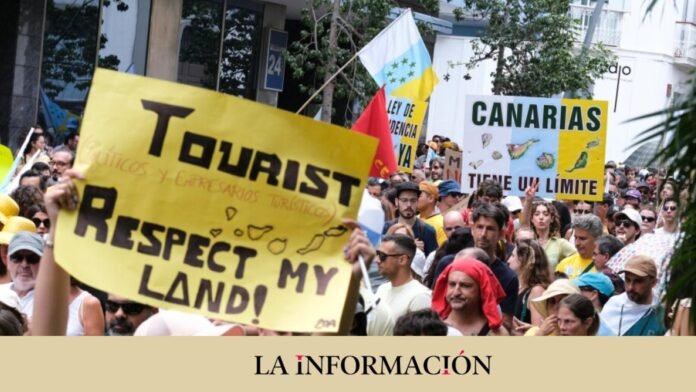While Spain prepares to break a new record for foreign tourists in 2024, if Braintrust’s forecasts are met – it foresees 91 million international travelers, 7% more than in 2023 -, the sector is discussing what is the appropriate tourism model to protect The engine of the economy and employment in a sustainable way that does not harm the quality of life of residents and their environment, especially small and medium-sized municipalities, which face greater pressure from the saturation of mass tourism.
Although this debate has been a constant in the industry in recent years, the mobilizations that thousands of Canarian citizens staged a few weeks ago in protest of a mass tourism model that, they say, is overwhelming the Atlantic archipelago, have resurrected the ghosts . of tourist taxes, which are fashionable in Europe and already have a presence in some Spanish regions such as Catalonia or the Balearic Islands. In the case of the first, overnight stays are taxed and the cost ranges between 0.60 and 3.50 euros per person per unit of stay, while in the second, possible environmental damage is taxed and the amount can rise to two euros. per night.
The majority rejects these rates in the hotel sector, where employers such as Exceltur or CEHAT have reiterated on several occasions their refusal to impose the aforementioned collections. But the dilemma came to light again at a recent breakfast organized by the Hotusa Group, where the Portuguese Ambassador to Spain, Jolate António da Costa, defended the imposition of fees on tourists as “compensation for the services we provide to “Who visits us and does not pay taxes in our cities.” However, the Portuguese diplomat also assured that this measure is not enough to stop mass tourism and focused on “convincing citizens that it is good for the socioeconomic development of their cities.”
Far from being implemented in more Spanish cities
In Europe, tourist taxes are a reality in more than twenty countries. One of the most recent cases has been the pilot test that Venice launched last April to charge an ‘access fee’ of five euros to occasional visitors who want to tour its old town in order to manage tourist flows and “discourage “. “daily tourism.” However, in Spain, with the exception of Catalonia and the Balearic Islands, this ‘toll’ seems to be a utopia, at least in the short term.
Four days after the protests on the islands, the plenary session of the Canary Islands Parliament rejected a non-law proposal presented by the PSOE for the implementation of a tax on tourist overnight stays, among others aimed at controlling tourist growth. This proposal has the same path in Madrid, whose mayor José Luis Martínez-Almeida approved a forum organized this week by the Barcelona Society of Social and Economic Studies of Treball Promotion (SBEES) to discard this measure due to the difficulty in its application and because p It can restore competitiveness to the capital among other European cities that are already applying it. If implemented, the next community could be Andalusia. There, the Minister of Tourism, Culture and Sports, Arturo Bernal, announced in a recent interview on Onda Cero that on May 27 the Andalusian Administration will sit down with the sector to discuss the tax on tourists who visit the region.
The unions ask to reform the tourism model
From the other side of the trench, union forces advocate a reform of the mass tourism model that, in the opinion of UGT, “is unsustainable for our country in the long term.” “We have time to change it, but we need more regulation, less ‘ultracapitalism’, more qualified entrepreneurs, less job insecurity, better salaries and, above all, a determined commitment from the Government to promote sectors and activities of high technological value that have an impact. in the modernization and digitalization of the Services sector, the true economic engine of our country”, says Antonio Oviedo, general secretary of FeSMC-UGT.

